Searching for the best hardwood floors that wont scratch? In this article, we’ll highlight what are the best hardwood floors that wont scratch, focusing on the most scratch-resistant types of hardwood flooring. You’ll learn about durable wood species, engineered hardwood options, and protective finishes. Plus, we’ll provide tips for keeping your floors scratch-free. Let’s dive into the best hardwood floors for your home.
Introduction to Durable Wood Flooring
Durable wood flooring is a top priority for many homeowners, especially those with pets or active families. While hardwood floors have long been admired for their timeless beauty, traditional options can sometimes be vulnerable to scratches and everyday wear. Fortunately, advancements in hardwood flooring technology have led to the creation of scratch resistant options that stand up to the demands of modern life.
Today’s hardwood floors often feature a specially engineered wear layer designed to resist scratches, dents, and the effects of daily wear and tear. Engineered hardwood is a popular choice, offering the classic look of wood flooring with enhanced durability thanks to its multi-layer construction. Solid wood remains a favorite for its natural appeal, but newer finishes and protective coatings have made it more resilient than ever. For those seeking an eco-friendly and tough alternative, bamboo flooring is another excellent option, known for its strength and resistance to scratches.
Whether you’re a pet owner worried about claws or simply want floors that can handle the hustle and bustle of daily life, there are durable hardwood flooring solutions to fit your needs. Each type—engineered hardwood, solid wood, and bamboo—brings unique features to the table, ensuring your floors stay beautiful and resistant to scratches for years to come.
Key Takeaways
- Scratch resistance in hardwood flooring is crucial for high-traffic areas and can be enhanced by selecting woods with high Janka ratings, engineered hardwood, and specialized finishes.
- Engineered hardwood offers superior durability and scratch resistance compared to solid wood, making it suitable for moisture-prone areas and reducing the need for frequent refinishing.
- Protective coatings, such as aluminum oxide finishes, significantly enhance the scratch resistance and longevity of hardwood floors while requiring minimal maintenance.
Understanding Scratch Resistance in Hardwood Flooring
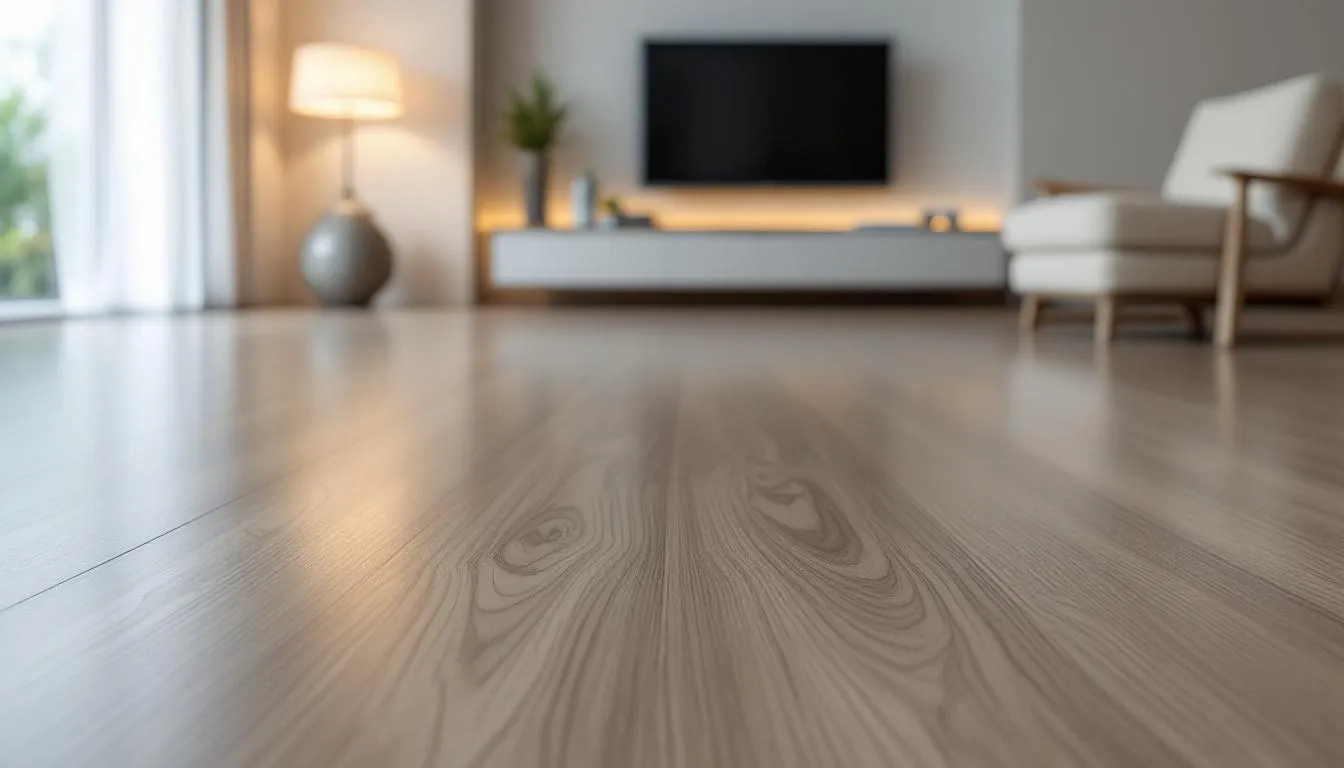
Scratch resistance in hardwood flooring is not just a luxury but a necessity for maintaining a pristine appearance in high-traffic areas. Several factors contribute to the scratch resistance of hardwood floors, including:
- High Janka ratings
- Engineered hardwood
- Specialized finishes These elements work together to create a flooring surface that can withstand the rigors of daily life.
The durability of hardwood floors largely depends on selecting a resistant finish. Additionally, the thickness of the wear layer significantly influences the flooring’s scratch resistance. For instance, Dogwood flooring offers four times more scratch resistance compared to traditional wood flooring, making it an excellent choice for busy households. As an example, Brazilian Walnut is a popular choice due to its exceptional hardness and scratch-resistant properties.
Wood species such as Brazilian Walnut, Santos Mahogany, and Brazilian Cherry are renowned for their high Janka ratings, significantly enhancing their scratch resistance. Regular cleaning and avoiding harsh chemicals are essential maintenance practices that can extend the life and beauty of your hardwood floors.
Top Scratch-Resistant Wood Species
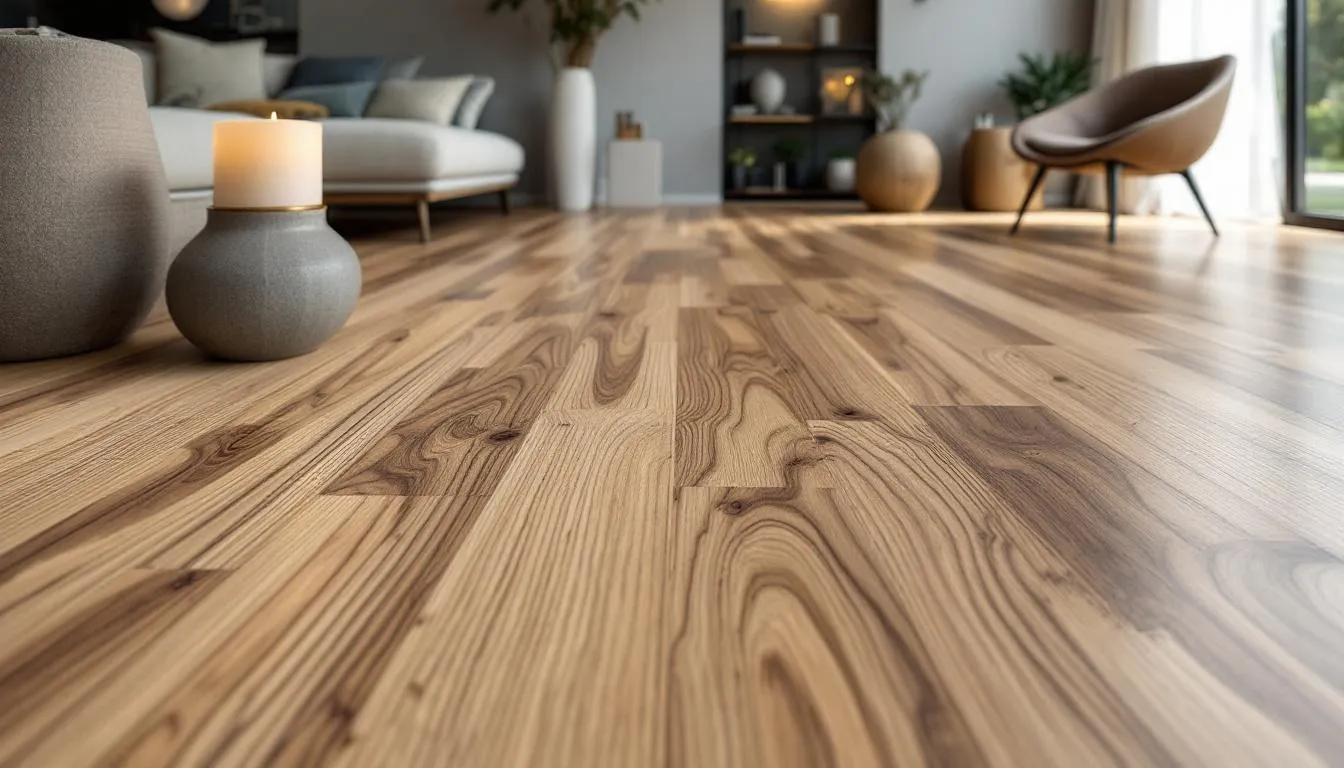
The Janka hardness rating system compares the scratch resistance of wood species by measuring the force required to embed a steel ball into the wood, indicating its wear resistance and scratching.
Hickory, with a Janka rating of 1,820, ranks among the most durable hardwoods, making it ideal for households with pets and children. White Oak, with a Janka rating of 1,360, also offers substantial scratch resistance, making it popular for busy homes. Red oak, another popular choice, has a Janka rating of 1,290 and is widely used for its durability and attractive grain, making it a reliable option for scratch-resistant hardwood flooring. Additionally, these woods are considered some of the most durable hardwoods available.
Brazilian Cherry stands out as one of the hardest wood flooring options with the following features:
- Janka rating of 2,350
- Ideal for high-traffic environments
- Suitable for pet-friendly environments
- Exceptional scratch resistance
Engineered Hardwood: A Durable Alternative
Engineered hardwood features:
- A layered structure with a top hardwood veneer bonded to multiple plywood layers
- Enhanced durability
- More resistance to scratches and dents than solid wood in the process.
- Manufactured using high pressure and heat, which densifies the wood fibers and further increases durability and scratch resistance.
This multi-layered laminate construction not only boosts scratch resistance but also maintains the integrity of the floor, showcasing its resilience. A thicker wear layer further improves scratch resistance and offers a softer refinishing opportunity, while the top layer enhances overall durability. If the surface is scratched, it can still be refinished effectively, making it an excellent choice for scratch resistant flooring. Gluing is a common method for installing engineered hardwood, and installing it with proper techniques ensures long-lasting performance.
Engineered hardwood with an aluminum oxide finish provides superior scratch protection and comes in various styles to match any home décor. This combination of durability and aesthetic appeal makes engineered hardwood a practical and attractive flooring option.
Protective Coatings for Enhanced Durability
Protective coating significantly enhances the scratch resistance of hardwood floors. For instance, aluminum oxide finishes are highly durable and extend the lifespan of hardwood floors. Urethane aluminum oxide finishes not only resist scratches but also amplify the wood’s natural grain, enhancing its aesthetic appeal.
Aluminum oxide coatings also provide UV resistance, preventing fading and preserving the flooring’s color integrity. Requiring minimal maintenance, such as regular dry mopping or vacuuming, these finishes are practical for busy households.
Consider the maintenance required when choosing a finish. High-gloss finishes enhance brightness but show imperfections more readily than matte or satin finishes, which effectively conceal dirt and scratches and can affect the overall appearance.
Comparing Solid Wood vs. Engineered Hardwood
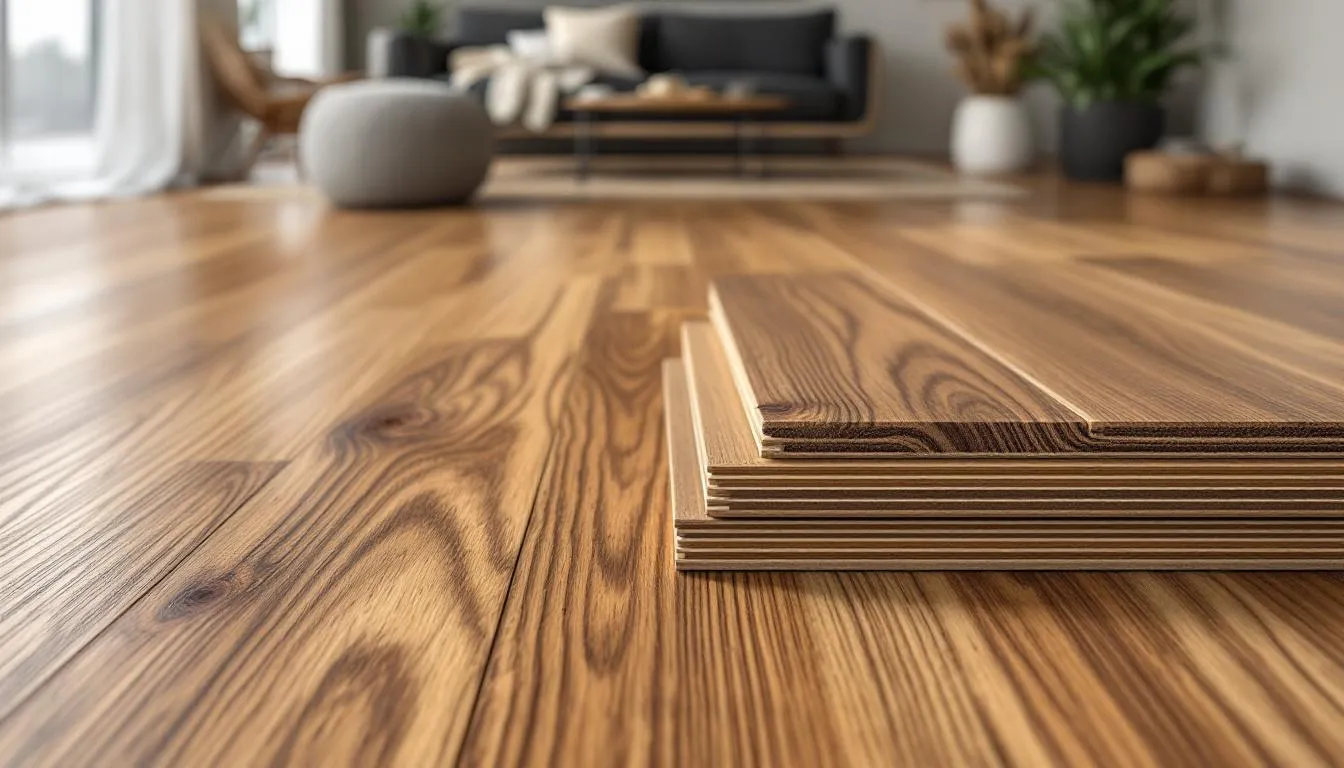
Solid hardwood flooring, crafted from a single piece of wood, offers a classic and timeless look. However, it needs regular humidity control to prevent warping and mold, and often requires refinishing every 7-10 years, depending on foot traffic. A hardwood floor can enhance the aesthetic appeal of any space, just like beautiful wood floors do.
Engineered hardwood flooring, with its multi-layered structure, offers excellent moisture resistance and greater stability against humidity fluctuations, reducing the need for frequent refinishing. The plywood-backed veneer layer in engineered wood enhances its stability and durability.
The choice between solid and engineered hardwood depends on your home’s specific needs. Engineered wood suits moisture-prone areas, while solid wood is often chosen for its traditional appeal in living spaces. For both types, how the flooring is installed is crucial—properly installed hardwood ensures maximum durability and longevity.
Maintenance Tips for Scratch-Free Floors
Keeping hardwood floors scratch-free involves proactive measures like regular sweeping or vacuuming to remove dirt and sand that could scratch the finish over time. A ‘no shoes’ policy indoors can significantly reduce dirt tracked onto hardwood floors.
Rugs and welcome mats can minimize dirt and debris accumulation, especially in high-traffic areas. Protective pads under furniture can prevent scratches, dents, and material damage from moving chairs and other heavy items.
Matte finishes in high-traffic areas can effectively conceal dirt and scratches better than high-gloss finishes. Cleaning up accidents, such as water spills or pet incidents, promptly is crucial to prevent long-term damage to hardwood flooring.
Choosing the Right Finish for Your Lifestyle
Choosing the right finish for your hardwood floors should align with your household’s activity level and preferences. Satin finishes offer a balance of beauty and practicality, making them popular among homeowners.
Matte or satin finishes can help conceal scratches and imperfections, making them ideal for busy households and high-traffic areas. Selecting the appropriate finish enhances both the appearance and longevity of your hardwood floors.
Additional Considerations for Pet Owners
Pet owners should take extra steps to protect their hardwood floors. Keeping dog nails trimmed can prevent deep gouges and minimize scratches. Area rugs in high-traffic spots can protect floors from excessive wear caused by pets and dogs. Cleaning up pet accidents quickly is important to prevent staining and preserve the appearance of your hardwood floors.
Furniture leg caps can prevent scrapes from moving chairs and other mobile furniture, keeping your sealed hardwood floors in pristine condition while protecting your feet.
Best Rooms for Scratch-Resistant Hardwood Flooring
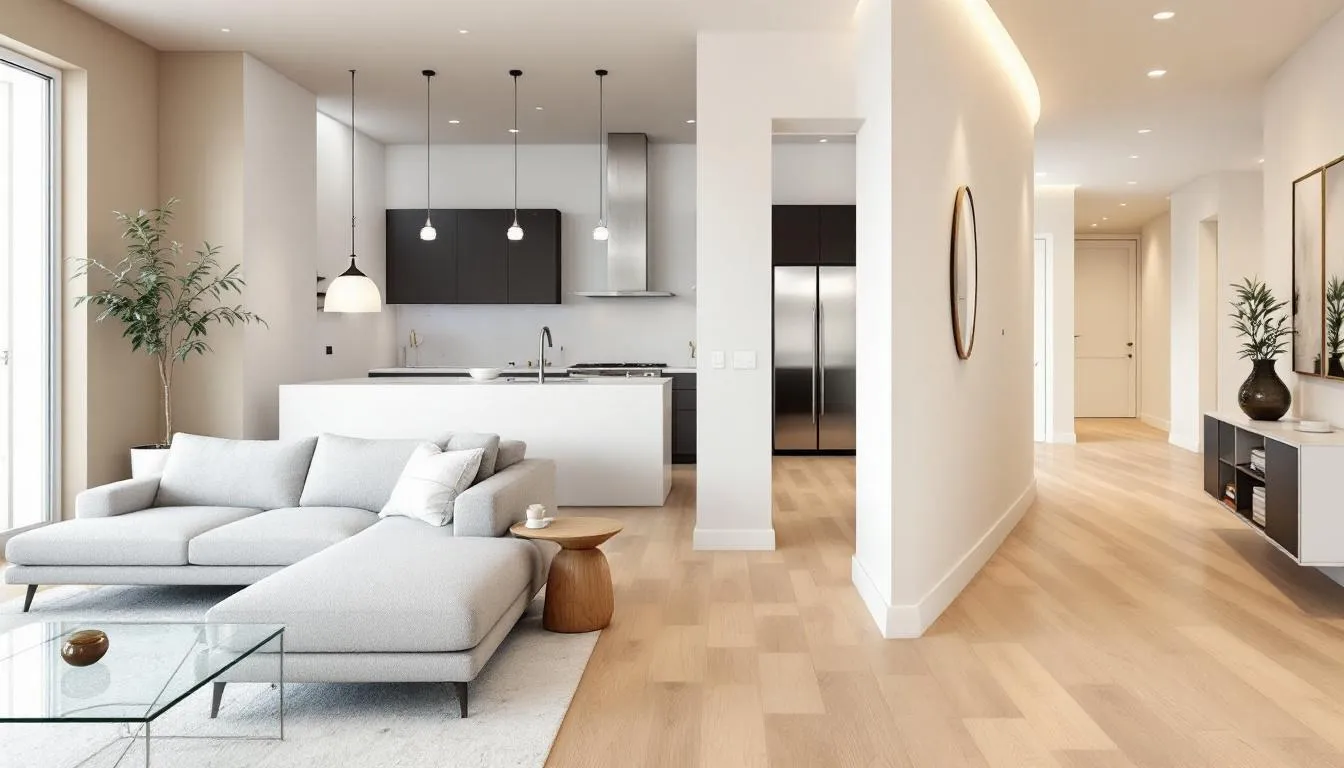
Scratch-resistant hardwood flooring is a versatile choice that can be installed in nearly any room of the home, offering both durability and style.
Living rooms benefit from scratch-resistant hardwood as they combine style with durability, accommodating both family activities and décor. Scratch-resistant hardwood flooring is beneficial in these areas due to frequent use and foot traffic.
Kitchens are ideal for scratch-resistant hardwood due to high foot traffic and potential for spills. Durable flooring is crucial in these busy environments to maintain functionality and aesthetic appeal. Engineered hardwood and other moisture-resistant flooring options can also be suitable for bathrooms, as they withstand the high-moisture conditions found in these rooms.
Hallways, as high-traffic areas, are well-suited for durable hardwood that resists scratches. Entryway mats can reduce dirt and moisture from reaching hardwood floors, further protecting them from damage.
Top Picks for Busy Households
For households bustling with activity, choosing the right hardwood flooring is essential to ensure your floors remain beautiful despite daily challenges. Here are some top picks for durable wood flooring that can handle the demands of busy families, pets, and high-traffic areas:
- Engineered hardwood flooring with a high Janka rating, such as Brazilian Walnut or Hickory, is a standout for its exceptional scratch resistance and long-lasting durability. The robust wear layer on these engineered floors helps protect against scratches and dents, making them ideal for homes with kids and pets.
- Solid wood flooring treated with a protective coating like aluminum oxide offers an extra shield against scratches, dents, and daily wear. This type of finish not only enhances scratch resistance but also extends the life of your hardwood floors.
- Bamboo flooring is a sustainable and highly durable choice, naturally resistant to scratches and moisture. Its resilience makes it a smart option for areas prone to spills or heavy foot traffic.
- Vinyl flooring is another versatile and budget-friendly solution, offering impressive resistance to scratches, dents, and water damage. Modern vinyl can mimic the look of real wood while providing superior durability and easy maintenance.
When selecting flooring for a busy household, consider the thickness of the wear layer, the scratch resistance of the material, and its water resistance. These features will help ensure your floors can withstand daily wear, resist scratches, and maintain their beauty and durability for the long haul.
Installation and Warranty
Ensuring your wood flooring stands the test of time starts with proper installation. Hiring a professional installer with experience in wood flooring is key to achieving a flawless finish and maximizing the durability of your floors. Before installation, make sure the subfloor is level and completely dry to prevent future issues like warping or water damage. It’s also important to follow the recommended installation method for your specific flooring type, whether it’s engineered hardwood, solid wood, or bamboo.
Adding a protective coating or finish during installation can further enhance the scratch resistance and longevity of your floors. This extra layer acts as a barrier against scratches, spills, and daily wear, helping your floors maintain their appearance for years.
In addition to expert installation, a comprehensive warranty is a must-have for homeowners. Look for warranties that cover not only manufacturing defects but also scratches and water damage. A strong warranty, backed by a reputable manufacturer, provides peace of mind and protects your investment in durable wood flooring.
By choosing high-quality materials, ensuring proper installation, and securing a solid warranty, you can enjoy beautiful, durable floors that stand up to the rigors of everyday life.
Where to Buy High-Quality Scratch-Resistant Hardwood
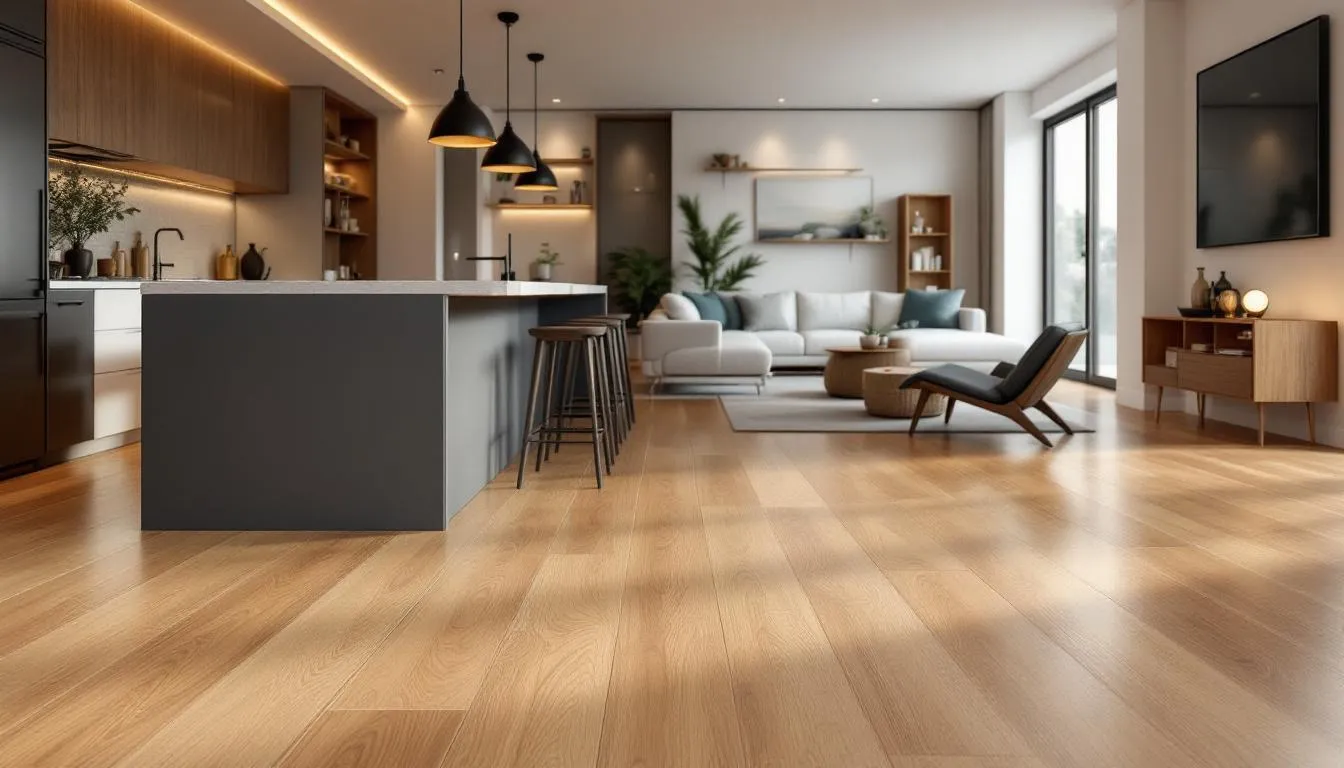
When purchasing high-quality scratch-resistant hardwood floors, opt to choose reputable suppliers. Look for options with high Janka ratings and durable hardwoods finishes for long-lasting performance. Selecting flooring with a well-constructed plank can further enhance scratch resistance and longevity.
Choosing floors that combine durability, style, and scratch resistance offers the best value for your investment, ensuring your hardwood floors remain beautiful and resilient for years.
Summary
In conclusion, choosing the right scratch-resistant hardwood flooring involves considering various factors such as wood species, engineered alternatives, protective coatings, and maintenance practices. Understanding the specific needs of your household will help you make an informed decision that balances durability and aesthetic appeal.
By investing in high-quality, scratch-resistant hardwood floors and following proper maintenance tips, you can enjoy beautiful, long-lasting flooring that withstands the demands of daily life. Whether you have a bustling household, pets, or simply want to maintain the elegance of your home, the right hardwood flooring can make all the difference.
Frequently Asked Questions
What makes hardwood floors scratch-resistant?
Hardwood floors are scratch-resistant due to factors like high Janka ratings, the use of engineered hardwood, and the application of scratch-resistant finishes. Opting for these features can significantly enhance the durability of your flooring.
Which wood species are the most scratch-resistant?
Hickory, White Oak, and Brazilian Cherry are highly scratch-resistant due to their elevated Janka hardness ratings. Choosing these species will provide durability and resilience for your wood surfaces.
While these hardwoods are excellent choices, some homeowners may also consider natural stone flooring, such as granite or travertine, for even greater durability and resistance to scratches in certain environments.
How can I maintain scratch-free hardwood floors?
To keep your hardwood floors scratch-free, focus on regular sweeping, using rugs and mats, and implementing a ‘no shoes’ policy along with protective pads under furniture. These practices will significantly reduce the risk of scratches and prolong the beauty of your floors.
Additionally, selecting flooring materials with natural resistance to mildew, such as cork, can further simplify maintenance and promote a healthier home environment.
Is engineered hardwood more durable than solid wood?
Engineered hardwood is more durable than solid wood in environments with fluctuating humidity due to its superior moisture resistance and stability. It is created by bonding multiple layers of wood together, resulting in a product with enhanced stability and resistance to environmental changes. This makes it a suitable choice for areas prone to moisture.
What finish is best for a household with pets?
A satin or matte finish is best for households with pets because it conceals scratches and imperfections effectively. These finishes not only hide wear but also help preserve the natural warmth and inviting appearance of hardwood floors.
